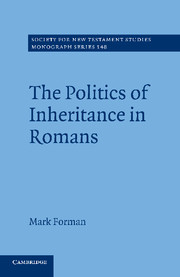Book contents
- Frontmatter
- Contents
- Preface
- List of abbreviations
- 1 Introduction: the politics of inheritance?
- 2 Some features of Greco-Roman society in the symbols, ritual and literature of Paul's time
- 3 Promising the world: inheritance in Romans 4:13–25
- 4 Suffering “conquerors”: inheritance in Romans 8:17–39
- 5 “Riches for the world”: inheritance in Romans 11:1
- 6 “Lords” over all the world: the language of inheritance in Galatians
- 7 Inheritance in 1 Corinthians and Colossians
- 8 Conclusions
- Bibliography
- Index
- References
4 - Suffering “conquerors”: inheritance in Romans 8:17–39
Published online by Cambridge University Press: 03 May 2011
- Frontmatter
- Contents
- Preface
- List of abbreviations
- 1 Introduction: the politics of inheritance?
- 2 Some features of Greco-Roman society in the symbols, ritual and literature of Paul's time
- 3 Promising the world: inheritance in Romans 4:13–25
- 4 Suffering “conquerors”: inheritance in Romans 8:17–39
- 5 “Riches for the world”: inheritance in Romans 11:1
- 6 “Lords” over all the world: the language of inheritance in Galatians
- 7 Inheritance in 1 Corinthians and Colossians
- 8 Conclusions
- Bibliography
- Index
- References
Summary
Introduction
The discussion of inheritance (κληρονόμος) in Rom. 4:13–25 concluded that it refers to a geographical reality which includes the concept of the people of God living on the restored earth, and that the term also carries with it political significance. The only other undisputed use of κληρονόμος and its cognates in Romans is in Rom. 8:17, which takes its place within the following text:
(14) For all who are led by the Spirit of God are children of God. (15) For you did not receive a spirit of slavery to fall back into fear, but you have received a spirit of adoption. When we cry, “Abba! Father!” (16) it is that very Spirit bearing witness with our spirit that we are children of God, (17) and if children, then heirs (κληρονόμοι), heirs of God (κληρονόμοι μὲν θεοῦ) and joint heirs with Christ (συγκληρονόμοι δὲ Χριστοῦ) if, in fact, we suffer with him so that we may also be glorified with him. (18) I consider that the sufferings of this present time are not worth comparing with the glory about to be revealed to us. (19) For the creation waits with eager longing for the revealing of the children of God; (20) for the creation was subjected to futility, not of its own will but by the will of the one who subjected it, in hope (21) that the creation itself will be set free from its bondage to decay and will obtain the freedom of the glory of the children of God. […]
- Type
- Chapter
- Information
- The Politics of Inheritance in Romans , pp. 102 - 135Publisher: Cambridge University PressPrint publication year: 2011

